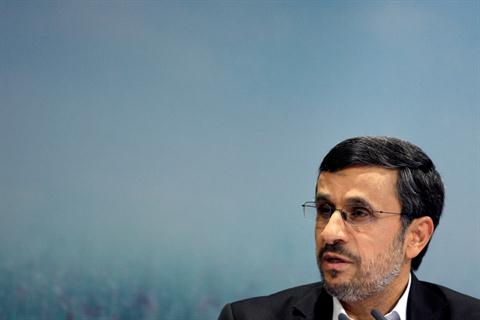(Reuters) - Iran's state budget is under pressure and the government has cut spending in some areas, President Mahmoud Ahmadinejad was quoted as saying as the country struggles to cope with Western economic sanctions.
"Right now in terms of the budget we are under pressure," Ahmadinejad said in a speech on Tuesday, according to the Iranian Students' News Agency.
"In many places the budget has become zero or has been cut by 25 percent," he said without elaborating.
Ahmadinejad did not mention reasons for the pressure but his remarks appeared an indirect acknowledgement that the sanctions, imposed over Iran's disputed nuclear program, are having a major impact on state revenues.
They have also triggered a plunge in Iran's rial currency, which the head of parliament's budget and planning committee said would be addressed via a further tightening of foreign exchange controls.
By largely freezing�Iran�out of the global banking system and banning sales of its oil to the European Union this year, the sanctions are believed to have slashed the government's oil income, which last year accounted for about two-thirds of state revenues.
The International Monetary Fund forecast in April that Iran would run a budget deficit of 0.3 percent of gross domestic product this year after a 0.2 percent surplus last year.
That forecast was based on the assumption that Iran's oil exports would fall 20 percent in volume terms this year. But some private analysts think they may drop nearly twice that much, which would mean a bigger hit to the budget.
CURRENCY CONTROLS
The rial lost about a third of its value in the free market to around 37,500 against the dollar in the 10 days to October 2.
By arresting dozens of foreign exchange traders on charges of manipulating the currency, authorities have been trying to pressure money changers into quoting stronger rates for the rial.
But so far that strategy appears to have failed, with many money changers refusing to do business.
So the government has shown signs of wanting to transfer all currency trade into official channels, such as a new foreign exchange centre where supplies of dollars to importers of some basic goods are rationed at rates near 25,000.
Gholamreza Mesbahi-Moghaddam, who heads parliament's budget and planning committee, indicated on Tuesday that authorities would further tighten control over currency trade, Mehr news agency reported.
"It is planned that from now on, all currency transactions outside of the banking and money-changing system will be controlled," he was quoted as saying.
"The Ministry of Intelligence, Ministry of Interior and police will enter the arena. Luckily so far, 50 of the currency market disruptors have been arrested."
The Iran Project is not responsible for the content of quoted articles.
# Tags











